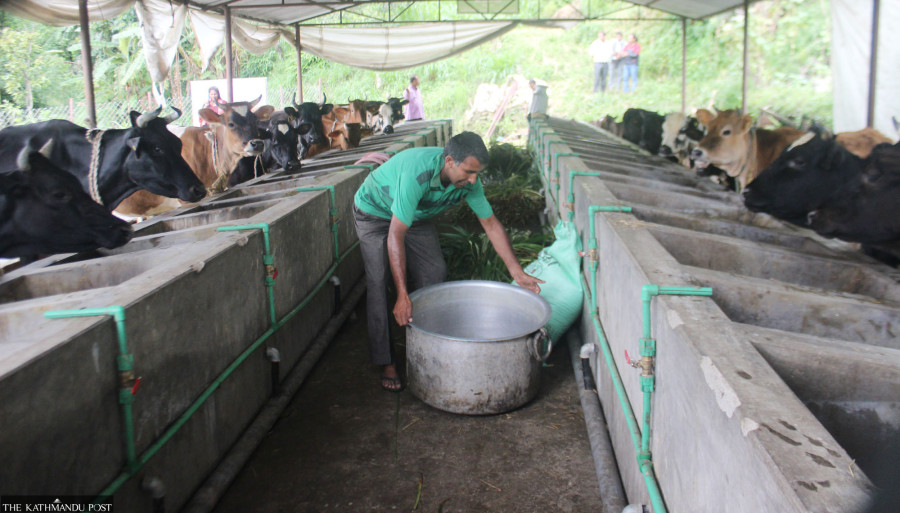Money
Flush season deepens dairy crisis as farmer dues mount
With Rs900 million in outstanding payments, falling sales and growing stockpiles threaten Nepal’s struggling dairy sector.
Post Report
The flush season has deepened the financial woes of dairy farmers, with outstanding payments now pending for around four months.
“We have dues of Rs900 million that need to be paid to farmers dating back to January. Sales have not improved over the past few years and have dropped further since the start of the flush season in December due to a rise in milk production,” said Nilkantha Gautam, information officer at the Dairy Development Corporation (DDC).
“As we rely solely on sales revenue to pay farmers, the drop in sales has only increased our outstanding dues.”
Nepal experiences two distinct dairy production periods—the flush and lean seasons. The flush season, which lasts from August to February, results in an oversupply of milk, whereas the lean season is characterised by reduced production. The production ratio between the two is roughly 1:3.
Last year, during the peak season, outstanding dues had climbed as high as Rs1.5 billion.
Amidst falling domestic consumption of dairy products, the DDC has been exploring export opportunities. Gautam said the process to export butter to China is underway.
“We have completed all procedures and submitted the required documents to Chinese buyers. However, no concrete agreement has been reached yet. We even obtained the lab test reports, but negotiations are still pending,” he said.
Officials believe that the price difference between DDC butter and that of private dairies might be delaying the decision from Chinese buyers. However, in terms of quality, Gautam said, private dairies "cannot compete" with DDC products.
According to DDC data, the corporation currently has a stockpile of 750 tonnes of butter and 950 tonnes of powdered milk. DDC sells approximately 85,000 to 86,000 litres of milk daily, generating a revenue of around Rs8.5 million. Among its 22 dairy products, milk remains the primary source of revenue.
“One of the main reasons for the decline in DDC milk sales is market competition," said Gautam. "We pay farmers the government-mandated rate and also bear higher staff and labour costs under government rules, making our production costs higher than those of private dairies."
As a result, DDC’s products are more expensive in the market compared to private dairy brands, prompting consumers to choose cheaper alternatives. Gautam added, “We have not been able to expand our market.”
The only way to compete, he said, would be to lower market prices—a step DDC cannot take given its already high production costs.
Rising dairy prices, with milk now exceeding Rs110 per litre, have also contributed to a decline in demand. Economic challenges, including declining income levels, growing unemployment, and increased youth migration, have resulted in stockpiles of unsold dairy products and farmers remaining unpaid for months.
Nepal’s dairy sector is currently experiencing a significant downturn.
In September last year, DDC took a Rs600 million loan to clear some of its outstanding dues. Both state-owned and private dairies report that the ongoing economic slowdown has hurt demand, restricted cash flow, and increased debt to farmers. Some dairy products have reportedly remained unsold for over a year.
“We have not yet collected full data, but unsold stock equals the price of 500 million litres of milk," said Raj Kumar Dahal, president of the Dairy Industries Association.
"Sales of dairy products are continuously falling while production keeps rising. On top of that, we have been unable to export dairy products, which has led to stockpiling."
Dahal added that with the onset of summer, demand is expected to increase slightly, helping to reduce stock and ease farmers' pending payments.
"We have been requesting the government to provide soft loans to help clear the dues to farmers, but our requests have been ignored," he said.
Responding to questions in Parliament in February, Prime Minister KP Sharma Oli stated that he had directed private dairies to settle outstanding dues to farmers, an issue that had remained unresolved for two years.
However, private dairies argue that they are facing a dairy recession—a situation they have never encountered before—and cannot pay farmers, even after the prime minister’s directive. Months ago, private dairies requested a government loan to help manage the crisis, but their request was rejected outright.




 8.67°C Kathmandu
8.67°C Kathmandu













